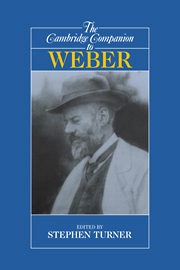Book contents
- Frontmatter
- Introduction
- PART I RATIONALITY, RATIONALIZATION, AND PSYCHOLOGY
- PART II POLITICS AND CULTURE
- PART III RELIGIONS AND THEIR ECONOMIC ETHICS
- PART IV LAW AND ECONOMICS
- 11 Max Weber as legal historian
- 12 From agrarian history to cross-cultural comparisons: Weber on Greco-Roman antiquity
- 13 Max Weber as economist and economic historian
- Further reading
- Index
12 - From agrarian history to cross-cultural comparisons: Weber on Greco-Roman antiquity
from PART IV - LAW AND ECONOMICS
Published online by Cambridge University Press: 28 May 2012
- Frontmatter
- Introduction
- PART I RATIONALITY, RATIONALIZATION, AND PSYCHOLOGY
- PART II POLITICS AND CULTURE
- PART III RELIGIONS AND THEIR ECONOMIC ETHICS
- PART IV LAW AND ECONOMICS
- 11 Max Weber as legal historian
- 12 From agrarian history to cross-cultural comparisons: Weber on Greco-Roman antiquity
- 13 Max Weber as economist and economic historian
- Further reading
- Index
Summary
Weber devoted a large part of his early work to the study of Greco-Roman antiquity. He published a book on Roman agrarian history, an article on the social causes of the decline of ancient culture, surveys of the agrarian history of ancient civilizations (Agrarverhältnisse im Altertum) in three successive editions of the encyclopedia Handwörterbuch der Staatstwissenschaften, and compared the ancient city (-state) with equivalents in European, and non-European cultures (Die Stadt, The City). There are numerous, if scattered, references to antiquity in his Economy and Society (E&S) and his collection of articles on the sociology of world religions (GARS).
Despite the considerable quantity of research and writing which Weber did on antiquity in his work prior to 1914 he never presented a comprehensive account of his view of antiquity. Rather he approached the subject under various questions and different angles. He started with agrarian history (and was occupied at the same time with current developments in the eastern parts of Prussia), widened his approach to a general view of the ancient economy, and finally used Greco-Roman Antiquity as one element for the cross-cultural comparisons he concentrated on in his later work.
Weber's Roman Agrarian History and its Importance to State and Civil Law of 1891 (the Habilitationsschrift by which he qualified himself for the discipline of Civil and Commercial Law; see MWG 1/2) is the only text which lives up to the usual standards of scholarly work on antiquity by constantly referring (though somewhat casually) to the ancient sources. It nevertheless proved to be highly controversial.
- Type
- Chapter
- Information
- The Cambridge Companion to Weber , pp. 240 - 255Publisher: Cambridge University PressPrint publication year: 2000
- 3
- Cited by



